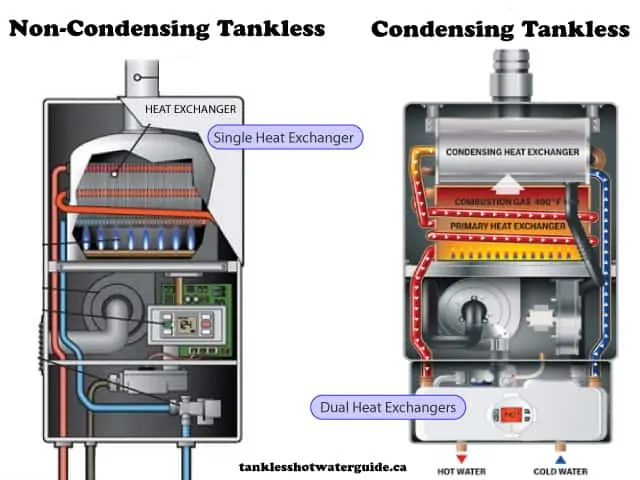When choosing a tankless water heater, you’re faced with two main options – condensing and non-condensing. Although they offer similar benefits, understanding the differences between the two types can help you make an informed decision that best meets your needs. In this article, we will explore the advantages and disadvantages of condensing and non-condensing tankless water heaters so that you can decide which one is right for you.
Exploring the Benefits of a Non-Condensing Tankless Water Heater
Non-condensing tankless water heaters are an excellent choice for those looking for a reliable, energy-efficient water heater that is easy to install and operate. Non-condensing models provide just enough warmth to make your shower experience perfect by heating water as it flows through its coils or heat exchangers. This kind of water heater does not require additional components or venting, making it an ideal choice for those who want a simple installation process. Non-condensing tankless water heaters also offer high-efficiency ratings, which can help you save money on your monthly energy bills.
Unpacking the Difference Between Condensing and Non-Condensing Models
Shedding light on the science behind hot showers, condensing tankless water heaters are a modern marvel – taking advantage of exhaust gases to provide luxurious warmth. This tankless water heater requires a dedicated venting system but offers higher efficiency ratings than non-condensing models. Condensing tankless water heaters are also better suited to larger households since they can handle more hot water demand than their non-condensing counterparts.
Examining Cost Savings With a Non-Condensing Tankless Water Heater
Non-condensing tankless water heaters provide an economical option that will put money back in your pocket without sacrificing quality! Since these units only heat the amount of water you need, rather than continuously heating a large tank of preheated water, you can save money on your monthly energy bills. Non-condensing models also require less maintenance and repairs than other types of water heaters, helping to reduce costs over time further.
Reviewing the Pros and Cons of a Condensing Tankless Water Heater
While condensing tankless water heaters offer more efficient heating than non-condensing models, they also have some drawbacks. The installation process for a condensing tankless water heater is often much more complicated and expensive than for a non-condensing model. Additionally, since these units require a dedicated venting system, you may have to alter your existing ventilation infrastructure to accommodate one.
Discovering How to Choose the Right Water Heater for You
When choosing between a condensing or non-condensing tankless water heater, you must consider your hot water needs, budget, and installation requirements. If you’re looking for an affordable, energy-efficient solution that doesn’t require extensive venting, a non-condensing tankless water heater may be ideal. On the other hand, if your household demands large amounts of hot water or you’re willing to invest in higher efficiency ratings with a dedicated venting system, a condensing tankless water heater may be your best bet.
Tips for Maintaining Your New Tankless Water Heater
No matter which type of tankless water heater you choose, proper maintenance is essential for optimal performance and longevity. Be sure to clean the filters on your unit at least once every three months to ensure optimal efficiency. Additionally, check the water supply lines and connections regularly to ensure no leaks or blockages are present. Following these simple maintenance tips, you can help your tankless water heater provide reliable hot water for many years. With proper installation and regular maintenance, you can enjoy a reliable source of hot water for years to come.
Conclusion
We have uncovered several advantages of installing a non-condensing tankless water heater in your home. From significant cost savings over the product’s life to improved energy efficiency and environmental sustainability, it is clear why this remains the ideal choice for many homeowners. Remember that one key difference between the two models is their features.
In general, condensing units work just as well as their non-condensing counterparts, but they come with extras like limited warranty coverage, lower water flow rates, and more efficient controllers. As you weigh your options and decide which unit to purchase, review these considerations carefully and make sure to consider the expected ROI.
Finally, remember that proper maintenance can extend the lifespan of any tankless water heater, so always practice vigilance when caring for your investment. If you are trying to decide between a condensing vs. a non-condensing tankless water heater for your home, this article has helped provide some clarity so you can make an informed decision.

